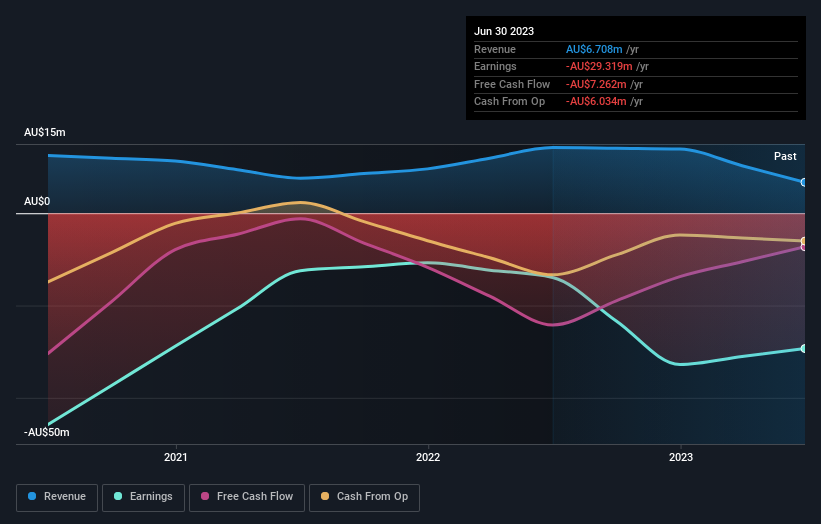The one-year returns have been notable for Buru Energy (ASX:BRU) shareholders despite underlying losses increasing
Passive investing in index funds can generate returns that roughly match the overall market. But if you pick the right individual stocks, you could make more than that. To wit, the Buru Energy Limited (ASX:BRU) share price is 59% higher than it was a year ago, much better than the market decline of around 0.2% (not including dividends) in the same period. If it can keep that out-performance up over the long term, investors will do very well! Also impressive, the stock is up 45% over three years, making long term shareholders happy, too.
Since it's been a strong week for Buru Energy shareholders, let's have a look at trend of the longer term fundamentals.
See our latest analysis for Buru Energy
Buru Energy wasn't profitable in the last twelve months, it is unlikely we'll see a strong correlation between its share price and its earnings per share (EPS). Arguably revenue is our next best option. Shareholders of unprofitable companies usually expect strong revenue growth. Some companies are willing to postpone profitability to grow revenue faster, but in that case one does expect good top-line growth.
In the last year Buru Energy saw its revenue shrink by 53%. The stock is up 59% in that time, a fine performance given the revenue drop. To us that means that there isn't a lot of correlation between the past revenue performance and the share price, but a closer look at analyst forecasts and the bottom line may well explain a lot.
The image below shows how earnings and revenue have tracked over time (if you click on the image you can see greater detail).
This free interactive report on Buru Energy's balance sheet strength is a great place to start, if you want to investigate the stock further.
A Different Perspective
It's good to see that Buru Energy has rewarded shareholders with a total shareholder return of 59% in the last twelve months. That certainly beats the loss of about 8% per year over the last half decade. This makes us a little wary, but the business might have turned around its fortunes. While it is well worth considering the different impacts that market conditions can have on the share price, there are other factors that are even more important. To that end, you should learn about the 5 warning signs we've spotted with Buru Energy (including 2 which are a bit concerning) .
Of course Buru Energy may not be the best stock to buy. So you may wish to see this free collection of growth stocks.
Please note, the market returns quoted in this article reflect the market weighted average returns of stocks that currently trade on Australian exchanges.
Have feedback on this article? Concerned about the content? Get in touch with us directly. Alternatively, email editorial-team (at) simplywallst.com.
This article by Simply Wall St is general in nature. We provide commentary based on historical data and analyst forecasts only using an unbiased methodology and our articles are not intended to be financial advice. It does not constitute a recommendation to buy or sell any stock, and does not take account of your objectives, or your financial situation. We aim to bring you long-term focused analysis driven by fundamental data. Note that our analysis may not factor in the latest price-sensitive company announcements or qualitative material. Simply Wall St has no position in any stocks mentioned.

 Yahoo Finance
Yahoo Finance 
